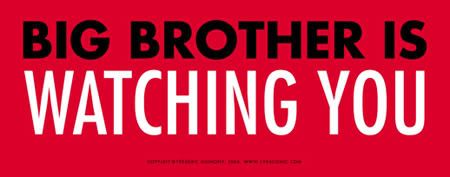Within 1984 George Orwell delivers what is essentially the most popular vision of dystopia ever written. The texts popularity is most commonly based on how Orwellian our society has become, or how 1984 has become more prophecy than fiction. Unfortunately, while the similarities behind Oceania and modern society are understandable, they aren’t the reason this novel should have such staying power. The true impact in 1984 is how completely and brilliantly Orwell envisioned dystopia.
Oceania is a society without flaws, without hope, and without end. The character Winston, until his ultimate acceptance of the party, portrays us. Humanity, for the most part, as it now exists. He is able to think freely, to rationalize, and to discover the world for himself. He may have to fight a battle against some very strong opposing forces to do so, but it is still an opportunity available to him. 1984 is the story of the final destruction of man as we are now, through Winston. Even O’Brien makes note to tell Winston he is, “the last man.” Men are extinguished in 1984, and only party members exist from the time after their extinction.
It could be realistic to ask, “What about the proles?” Winston asked himself the same question. Are they not still proof of humanities persistence? That was answered within the novel as well, “The proles are animals.” Through this answer each mention of the proles and their imaginary revolution is quenched as quickly as it is brought forward, and it is disturbingly correct. The proles are animals, even in an almost literal sense. They exist as the meat of the party, the cannon-fodder for wars and territory, and they could most properly be considered sheep. Their intellect has been forced downward by the party, the most intellectual eradicated, and their only real outlets include simple roles and the lottery. If there is a prophetic vision in 1984 to modern society, this is the most potent. Are we not often envisioned as sheep as well? We could be as much slaves to the forces in our lives as proles. Luckily, the integrity and intelligence of our society, while it is always in question (as it should be), is still a far cry from 1984, and I think most would suffer a revolution before we accepted a similar situation.
If there is any true threat proposed to us in 1984, it is the idea presented in altering reality. Although not quite as literally as when O’Brien claims he could float from the floor, as my ethnocentrism refuses me the ability to believe my mind could accept that, the idea of changing reality through the manipulation of history, language, and attitude is the strongest and most fearful aspect of the party. Oceania succeeded in removing thoughts from the brains of party members, and they did it not only through unspoken laws and the fear tactics of a repressive state apparatus, but also through what could be described as the destruction of academics. Removing thoughts is as easy as removing the knowledge that is their source. No one in Oceania is learned in anything other than their field of work, and even then they are barely adequate. Why should a society have 10 intellectual workers, when 100 average workers are capable of the same effort, and with less risk? Limiting the knowledge of an entire population is the most threatening aspect of 1984. The idea that this could be happening now without our knowledge is nothing short of scary, and the truth that no revolution could combat this or none would ever even be able to occur is even terrifying.
I suppose that in that context many could be correct in assuming 1984’s staying power is in how Orwellian our society has become. I can’t see it from that perspective, partly because I can’t take the bad without the good. Our society has adopted some patterns undeniably similar to the party, but we still retain the ability to question and fight against those policies. We are, unlike Wilson, still men, with at least some sense of freedom. Even if it is only the freedom to debate how much freedom we have, we still possess it. I could never accept Orwell’s book as prophecy or even an envisioning of what our society is headed towards, but I’d rather view it as a guide. Just as More’s Utopia was a guidebook in achieving what could be a perfect state, Orwell’s 1984 is also a guide. It is the guide to how totalitarian society could become if we don’t maintain a watchful eye on those in power, the knowledge of the populace, and the truth that could be avoiding us.
Labels: 1984, Big Brother, Books, Coursework, Dystopia, Fiction, George Orwell, Literature, Orwell, Reviews




On a completely unrelated note (aside from the fact that it deals with books) I had no idea that Nightwatch and Daywatch were actually books or that they had been translated. I snagged Nightwatch this morning so hopefully it's worth reading.